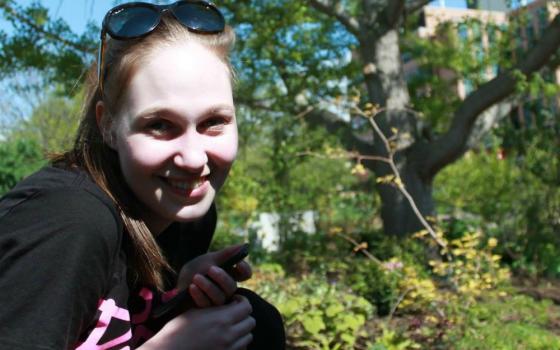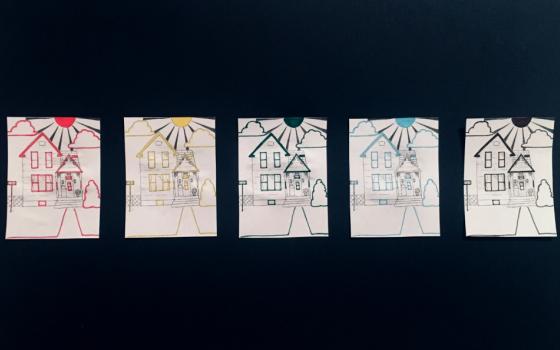Notes from the Field includes reports from young people volunteering in ministries of Catholic sisters. A partnership with Catholic Volunteer Network, the project began in the summer of 2015. This is our ninth round of bloggers: Samantha Wirth is the public policy fellow for Good Shepherd Services in New York City and Adele McKiernan is a Loretto Volunteer at Missouri Health Care for All in St. Louis.
___
In October, I lost a friend, tragically, to depression. The very next day, my mom called to tell me she had been diagnosed with stage 4 ovarian cancer. I have been coping with and bracing myself for loss and grief since early in my volunteer year.
Over the course of the past eight months, two of my four housemates left our program, both in ways that were painful to process. Often, I feel more like I am living in the absence of others than I am present to my own life.
One of my favorite poets, former poet laureate Kay Ryan, wrote "Things Shouldn't Be So Hard" in 2001 after the passing of her mother. She writes about the physical markers of her mom's life that now surround her — "where she used to stand before the sink" or "where she went out and back to get the mail" — and how this loss has been preserved in her memory. She ends the poem with the simple statement: "Things shouldn't be so hard."
By juxtaposing indulgence in and defiance of loss, she brings out how contradictory it can be. This tension has clung to me as I've processed various forms of loss this volunteer year.
When my former housemates moved out, the rest of us had to begin to rebuild our community in their absence, but, as Ryan puts it, people "leave deep tracks." I learned a lot from the former members of our community, and as I've grieved their exits, I've found it difficult to adapt and move forward when their presence is still so felt in the space.
There is coping with various forms of loss — death and departure — and there is fear of loss. Both have been strong forces during this volunteer year.
Along with these forms of loss — the loss of my friend, the departure of my housemates — I have coped with distance between me and some of the people I love most in the whole world.
Many of my friends are in New York and in Madison, Wisconsin, while my immediate family is in the Boston area. My partner and I are long-distance. I started completely from scratch in St. Louis as a Loretto Volunteer, and while this has been an invaluable exercise in self-sufficiency and allowed me to experience independence in a new way, it has been lonely.
Being so far from my mom during her cancer treatment, in a long-distance relationship, and away from my closest friends, all while my community here has been in flux, has challenged my ability to be my own support system. It has also forced me to see my own resilience.
Poet Joy Harjo wrote "Grace" in 1990.
Like Coyote, like Rabbit, we could not contain our terror and clowned our way through a season of false midnights. We had to swallow that town with laughter, so it would go down easy as honey. And one morning as the sun struggled to break ice, and our dreams had found us with coffee and pancakes in a truck stop along Highway 80, we found grace.
Since my mom was diagnosed with cancer and my friend passed away, I have been jolted into grace: a series of profound realizations about how precious life and relationships are. My friend and my mom's health care stories fuel my work as a community organizer at Missouri Health Care for All. The urgency to change our health care system and listen to people's personal experiences has become essential to me and my outlook on life and work.
If our lives are short and precious, we need to begin creating better systems to protect and improve them. We need to listen to one another's stories and concerns and hopes.
The more I have learned about the failures of our systems and my role in upholding their brokenness, I've encountered another form of loss: a loss of innocence that has motivated me to be more present to justice in my life. The blamelessness and lack of responsibility we know as children and are taught as white people in America have disappeared this year.
The personal resiliency and strength I have gained in confronting distances and losses in my own life have laid the groundwork for an awakening about the distances and losses between people in our society more generally. I have gained, through the pain of this year, a solemn understanding that I have social and historical responsibilities that are larger than myself.
Life is rife with loss, distance, pain and overwhelming responsibility. But the more we embrace the contours of these losses and learn from them with grace and resiliency, the more loss can become a chance for personal and collective renewal and growth.
[Adele McKiernan is a Loretto Volunteer in St. Louis working at Missouri Health Care for All as an organizing fellow.]


